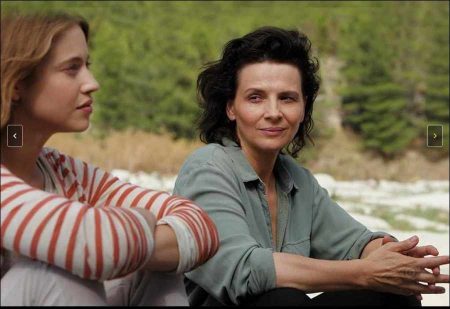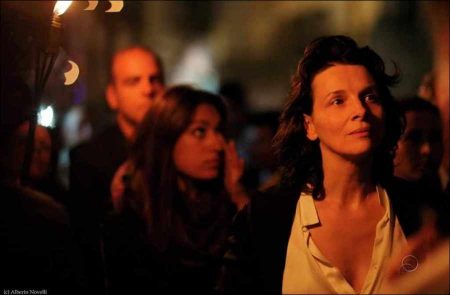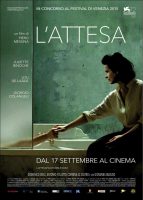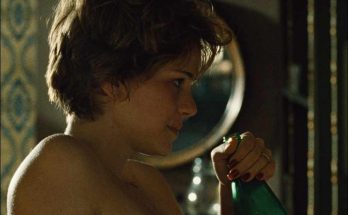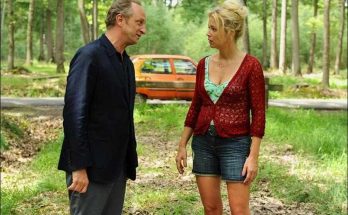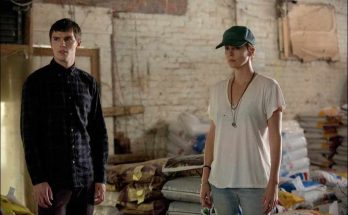The Wait movie storyline. Jeanne (Lou de Laâge) travels from France to Sicily to reunite with her beloved Giuseppe. But upon arriving, Jeanne finds Giuseppe mysteriously absent. She is welcomed instead by his mother Anna (Juliette Binoche), who does not regard Jeanne’s unexpected visit as a pleasant surprise. Worried, Jeanne makes numerous desperate calls to Giuseppe that go unanswered. Her uncertainty is compounded by Anna’s mercurial moods and oddly affected disengagement about Giuseppe’s absence. Slowly, Jeanne and Anna find in each other a meaningful camaraderie while waiting for the truth about Giuseppe to surface.
The Wait (Italian: L’attesa) is a 2015 Italian drama film directed by Piero Messina and starring Juliette Binoche. The film is loosely based on two works by Luigi Pirandello. It was screened in the main competition section of the 72nd Venice International Film Festival.
The film was inspired by a story Piero Messina heard from a friend, about a father who had lost his son, and when the father refused to talk about it, people around him began to act as if it had never happened. While writing the screenplay, Messina was recommended two works by Luigi Pirandello, the tragedy The Life I Gave You (La Vita che ti Diedi) and the short story “La camera in attesa”, and used those to tie the story together. Production was led by Indigo Film in collaboration with Barbary Films and Pathé. Juliette Binoche was cast early on, while Lou de Laâge was found late in the casting process through an audition.
Film Review for The Wait
A mother’s grief at the loss of her son underlies this cinematically dazzling debut, though a surfeit of style and too many unanswered questions keep auds at arm’s length.
Apart from the image of Jesus hanging from the cross — which, incidentally, is the first thing we see in Italian director Piero Messina’s “The Wait” — perhaps the most instantly recognizable scene in all Christian art is the Pietae, or the lamentation of Christ, in which the Virgin Mary cradles her lifeless son in her arms. While not a religious film per se, Messina’s profoundly dolorous debut — the sort that suits festivals just fine, but makes for depressing arthouse fare — could easily be seen as the visually gifted director’s reinterpretation of this iconic moment, casting Juliette Binoche (since “Blue,” cinema’s most gifted griever) as a mother awaiting the return (or resurrection?) of her absent son.
A clear disciple of Italian master Paolo Sorrentino, the film-school-trained Messina served as assistant director on “The Great Beauty,” and he adopts many of his mentor’s stylistic predilections on his first feature. “The Wait’s” dramatic premise could hardly be simpler, leaving considerable room to explore the project’s emotional and atmospheric dimensions: Binoche’s Anna, a single mother living in a remote Sicilian villa, mourns the death of her son, Giuseppe, when she is caught off-guard by the arrival of Jeanne (Lou de Laage), who claims to be his lover. Instead of admitting the truth, Anna decides to hold off “for the right time to tell her,” using Jeanne’s naivete to sustain the illusion that he is not really gone.
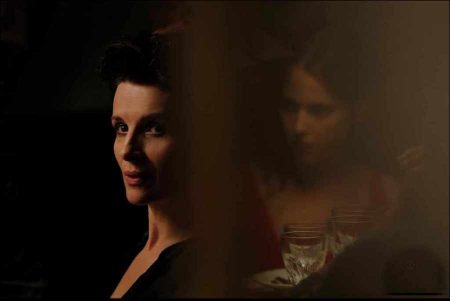
And so they wait. Jeanne, who has flown from Paris to Sicily because Giuseppe asked, allows her guilt to get the better of her, choosing to imagine that her lover is avoiding her, which could have something to do with an unspecified disagreement the previous summer (likely infidelity). Anna plays along. Pretending as if she’s in contact with Giuseppe, she tells Jeanne that he’s promised to return in time for Easter — which supplies not only a vibrant Sicilian parade, but also a significant Christian symbol, being the day of the son’s resurrection.
In no small way, “The Wait” serves as an exploration of faith. Deliberately ambiguous, the film ends without ever having given a clear answer on what happened to Giuseppe. Messina even goes so far as to cast an actor, Giovanni Anzaldo, in the role for a few scenes that we can reasonably assume take place exclusively in Anna’s head.
Though his mother spends the first act trying to accept his passing, something changes with Jeanne’s arrival: Giuseppe is still alive in the young woman’s mind, and Anna chooses to believe this reality instead of her own. After all, Giuseppe has symbolically “died” once before, as all sons inevitably do when leaving home to start their own lives, and Jeanne is proof of this — a mystery to be figured out, not at all the “type” Anna might have imagined for her son. But when even this fantasy starts to crumble, Anna tries to transfer it forward: “Let him go,” she tells Jeanne, while holding on herself. “He’ll live a life … fall in love … maybe with another woman.”

Though “The Wait” is essentially a two-hander, other minor characters appear, most notably a longtime family servant (Giorgio Colangeli) who dutifully keeps his mouth shut, but can hardly bear to see Jeanne suffer. Though he never explains the situation outright, his facial expressions give audiences all the indication they need to interpret what’s really going on — though Messina is almost maddeningly vague at times. Just how dense is Jeanne, after all, that she doesn’t pick up on the clues? Or might she be ignoring them on purpose?
One of the breakout stars of Melanie Laurent’s “Breathe,” de Laage hasn’t mastered Binoche’s incredible gift for minimalism — that unique ability to convey virtually any emotion (in this case, profound suffering) through something so simple as a far-off stare or subtle twitch of the cheek. Still, de Laage’s more outwardly physical acting technique is hardly a liability, as the enigmatic-looking young thesp (who belongs more to the Lea Seydoux school of naturally pouty beauties) brings something different to the dynamic, which, after all, hinges on how these two very different women react to Giuseppe’s absence.
Projects like this, which take place almost entirely in one location (Anna’s villa), are often criticized for being overly theatrical, and coincidentally enough, Messina was partly inspired by the play “The Life I Gave You” by Luigi Pirandello (the Nobel winner who wrote “Six Characters in Search of an Author”), in which a mother refuses to accept her son’s death. Still, although “The Wait” focuses on the psychological dance between Giuseppe’s mother and lover, the director has approached the potentially stagy material in almost strictly cinematic terms.
Benefiting enormously from its evocative Sicilian setting, this widescreen experience makes bewitching use of space, time and sound, creating an almost meditative atmosphere in which patient-minded auds might respond to its themes. Some scenes feel somewhat disembodied, such as Jeanne’s arrival via a winding volcanic road, set either to the XX’s “Missing” (a recurring theme song) or equivalently melancholy electronic tracks. Others, such as the one in which Anna first re-enters her son’s room or Jeanne sits before an enormous stained-glass window, privilege the actors’ mental state, taking place in haunting near-silence, like something out of an eerie ghost story — which the film also happens to be.
Watching “The Wait,” there can be little doubt that this first-time helmer has the potential to become one of Italy’s most prominent new voices (the signs were there as early as his Cannes-selected 2011 student film, “Terra,” another abstractly stylized exercise in psychological identification featuring Colangeli). From Sorrentino, Messina has further developed his ability to deliver a stunning sensory experience, though the treatment feels inadequate for such lean material. If anything, his aesthetic choices are too impressive, calling attention to themselves, rather than discreetly enabling the appropriate emotional reaction. He wants to invite us into the characters’ subconscious, but leaves us admiring the surface. Like his characters, we’re kept waiting for revelations that will never come.
The Wait (2015)
L’attesa
Directed by: Piero Messina
Starring: Juliette Binoche, Lou de Laâge, Giorgio Colangeli, Domenico Diele, Giovanni Anzaldo, Antonio Folletto, Corinna Locastro
Screenplay by: Giacomo Bendotti, Ilaria Macchia, Andrea Paolo Massara, Piero Messina
Production Design by: Marco Dentici
Cinematography by: Francesco Di Giacomo
Film Editing by: Paola Freddi
Costume Design by: Maurizio Millenotti
Set Decoration by: Laura Casalini
Art Direction by: Veronica Gambacurta, Laura Inglese, Karolina Krutul, Viviana Lo Russo, Valentina Troccoli
Music by: Piero Messina, Alma Napolitano, Marco Mangani
MPAA Rating: None.
Distributed by: Medusa Film (Italy), Bellissima Films (France), Oscilloscope (United States)
Release Date: September 5, 2015 (Venice), September 17, 2015 (Italy), December 16, 2015 (France), April 29, 2016 (United States)
Views: 13
